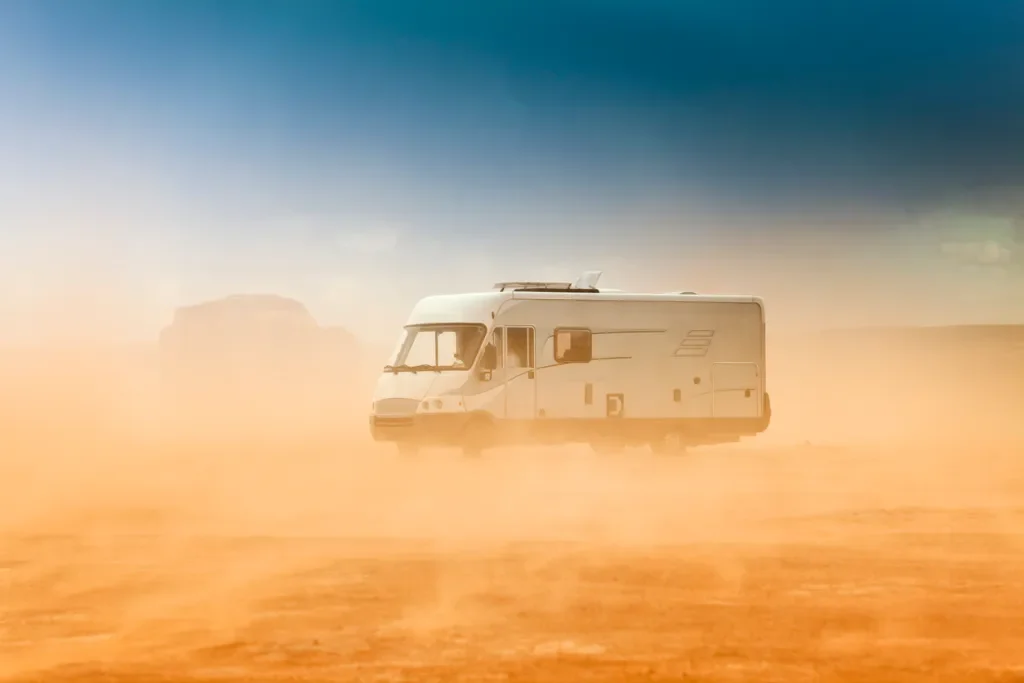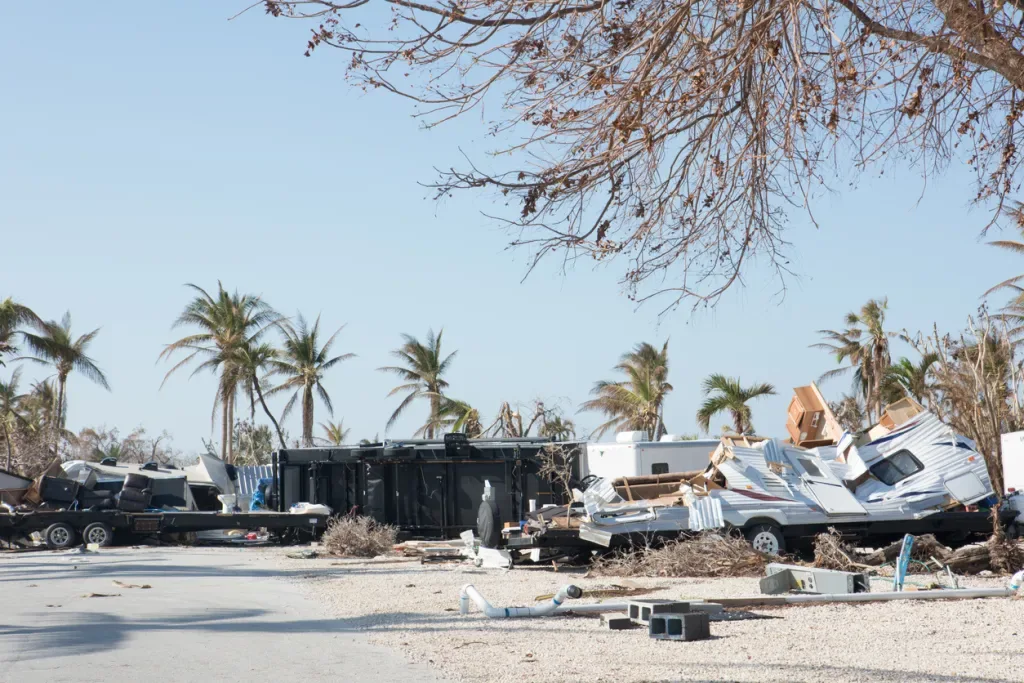If you aren’t aware, how you park your RV in heavy winds matters. With or without notice, Mother Nature can test you and your precious camper.
Unfortunately, we’ve seen a few instances where a gust at the right angle knocked trailers on their side. The last thing we want is for yours to be next.
Today, we’re sharing all you need to know to stay safe when the weather doesn’t cooperate.
Let’s dive in!

When Should You Stay Parked in Your RV in Heavy Winds?
There could come a time when the conditions are too dangerous to drive. There’s no hard and fast rule for when you should stay parked. You’ll want to consider the wind speed, direction, and your vehicle’s driving speed and weight.
Reducing your speed helps you stay steady on the road. However, gusts over 60 mph are strong enough to tip a semi. It’s best to think twice about driving when against gale forces of 30 to 40 mph.
If you or someone traveling with you feels anxious or unsafe with the weather, find a secure place to park your RV. Wait until conditions improve to get back on the road. We buy into the idea that it’s better to be safe than sorry.
How Much Wind Can a Parked RV Withstand?
Just because you’re stationary doesn’t mean there’s nothing to worry about. Strong gusts can still threaten trailers sitting in campgrounds or storage. How much your rig can withstand depends on its size and the direction and intensity of the breeze.
Researchers at Kent State found gusts exceeding 91 mph are enough to topple a parked RV. However, these incidents are infrequent and typically only occur during tornados and hurricanes. Owners generally have little to worry about when set up in a campground.
Although these incidents are rare, it’s essential to take them seriously. Being proactive can help keep you and your camper safe. You could save yourself a lot of money and prevent serious injury.
If you’re on the road: Is It Too Windy to Drive Your RV?
How Do You Stabilize a Parked RV in the Wind?
Unfortunately, sitting inside a parked RV during heavy winds can be a terrifying experience. Even in the biggest rigs, you’ll feel a lot of movement. If you’ve never had a panic attack, this could cause you to experience one. Luckily, there are some things you can do to stabilize your camper.
Whenever possible, one of the first things you want to do is position the front of your RV into the wind. You don’t want it to hit the broad side of your trailer. This can help you avoid the rocking sensation felt during these events.
If you have a towable trailer, connecting it to your tow vehicle can be helpful. It provides more support, stability, and protection. The extra contact with the ground can help avoid further damage.
You can also close your slides to limit the chances that the gusts get leverage by getting under your slides. Additionally, you can increase the weight of your camper to help lower the center of gravity. The easiest way to add weight is to fill your waste and freshwater tanks. Depending on the size, this could add 1,000 to 1,500 pounds.
Hazards To Consider When Parking Your RV in Heavy Wind
You should be aware of hidden dangers when parking your RV in heavy winds. If you’re not careful, they can cause severe damage and potentially even be deadly.
For starters, be aware of the potential for falling trees or branches. Even a small tree branch falling onto your trailer can do severe damage. However, a big branch could completely crush your trailer.
If you’re sitting under a canopy of old trees, packing and moving may be your best option. It’s hard to predict when one could come crashing down.
Two other significant hazards are airborne objects and downed power lines. These are common dangers even when you’re not RVing, so take them seriously. Stay away from glass windows, and don’t walk near fallen power lines. One false step, and you could be in for a shocking surprise.
Safety Tips for RVing in Heavy Winds and Severe Weather
As we’ve all likely experienced, Mother Nature can quickly change her mind. Your decisions could have severe consequences for you and anyone traveling with you. If you’re RV is parked in windy weather, you should be ready to respond.
Many RVs have 12-volt battery systems. It’s wise to fully charge your battery bank to have power in case of a power outage.
You may not have full functionality of your RV, but it’s better than nothing. A standard battery bank can power lights, fans, and other essentials for several hours.
When preparing for the storm, it’s not a bad idea to empty your black and gray water tanks and fill your freshwater. It may be several days before you get a chance to dump them. This can make being stuck inside all the more unpleasant.
Like the Boy Scouts used to say, “Always be prepared.” In many cases, severe weather can hit with or without notice. Having emergency supplies and equipment on hand can be incredibly helpful. You may never use them, but you’ll be glad you have them if you do.

How To Avoid Parking Your RV in Heavy Winds
If you want to avoid parking your RV in heavy winds altogether, you can do a few things. For starters, watch the forecast like a hawk. Stay aware of any potential concerns. Additionally, turn on notifications on your phone for emergency alerts.
One great thing about RVs is that they’re on wheels. If there’s a chance severe weather will impact an area where you’re camping, you can pack up and move to another spot. No matter how epic the boondocking location is, it’s not worth risking your safety.
While Mother Nature can be indecisive, that’s not always the case. Different areas of the country have higher risks at specific times of the year.
For example, hurricane season runs from June 1 to November 30. Additionally, tornado season is typically April, May, and June. It may be worth planning your trip around these times.
RVing isn’t all beautiful sunsets and mountain views: 5 Ways RVing Can Risk Your Life.
Don’t Downplay the Wind
You only have to have to park your RV in heavy winds once before you’ll take this threat seriously. Trust us. You won’t take it lightly once you’ve weathered a storm or two during your travels.
So stay aware of the forecast and be mindful of your surroundings when parking your rig. And don’t forget to keep your emergency kit well stocked.
We’ll Help You Find the Best Free Camping in the USA
You should give it a try!
As a matter of fact, these free campsites are yours to enjoy. Every time you pay federal taxes, you’re contributing to these lands.
Become a FREE CAMPING INSIDER and join the 100,000 campers who love to score the best site!
We’ll send you the 50 Best Free Campsites in the USA (one per state). Access the list by submitting your email below: